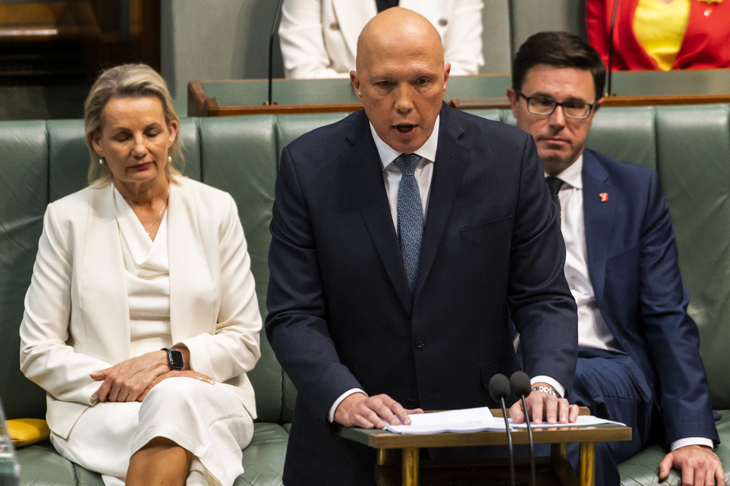You would think that by now the Liberal party would have caught on to how political parties should promote their policies. Policies must be clear, concise and unequivocal or they will get lost in a fog of confusion and doubt. And yet, despite this well-established principle that brought success to the great Liberal leaders, Menzies, Howard and Bolte, today’s party seems to have abandoned it. This conclusion is abundantly clear from the Liberal party’s policy on the proposed Aboriginal Voice. The Voice has features that should repel all Liberals from supporting it and give rise to a strong, unified, consistent and persuasive campaign against it, in any form. The proposed Voice is obviously racist, as the only people entitled to take part in it are members of the Aboriginal race. It is entirely undemocratic, as its membership will be appointed and not elected. It is divisive, because at least half the population is opposed to it. It is disruptive of the constitutional balance we have between all levels of government by introducing a third level, (or a fourth, if you include the Rudd government-in-exile) for which no real or apparent need has been shown. It will generate an avalanche of litigation brought to frustrate government decisions, especially on development projects. It will be with us forever, at monumental cost, with the Voice enabled to repeat and renew its representations at whim. And this is proposed to be done, not in the measured way it deserves through a constitutional convention, but in a knee-jerk reaction where any differing opinion is ridiculed and the government refuses to answer reasonable requests about the powers of the Voice.
Accordingly, the party could have given a plain No to the Voice from the beginning, including its subsidiary demands that we now know are part and parcel of the whole proposal and which will follow if it is approved in the referendum. This would have meant saying No to the Voice, whether written into the constitution or created by legislation. It would have meant saying No in advance to an absurd treaty between the nation and a race-based section of its own population; No to so-called reparations; No to ‘financial settlements’; No to ‘seeking a percentage of GDP’, and No to what is dressed up as truth-telling but which will be nothing but a gigantic log of claims where truth will be the first casualty and the last consideration.
But no, the Liberal party had to have something far more complicated and confusing. It has thus produced a hybrid policy which will simply confuse the voters and cast continuing doubt over what, if anything, drives Liberal party philosophy. There are three grievous defects in this policy.
First, instead of opposing the Voice outright, the Liberal party’s policy is to have not one Voice but a whole series of them, lumped together as local and regional Voices. So, the abysmal defects of the Voice are to be multiplied by the number of local and regional voices, a refinement that makes the Voice at least 20 times as bad as it was. As David Littleproud, the National party leader has pointed out, regions in Australia are up to hundreds of thousands of square kilometres. Thus, the Liberal position is to accept not the proposed Voice, but a bigger and more pervasive one than the Voice for which the ALP and the Greens are contending.
Secondly, the Liberal party now says it is legitimate if the Voice is created by legislation, rather than having it welded into the constitution. But this is simply an alternative means of achieving the same result, a Voice for one race, giving it exclusive rights and bringing about a fundamental change in the way our democratic government is structured. As for the argument that it could always be amended or abolished by legislation, the vagaries and caprices of Australia’s elections and the world of reality should tell us this would never happen.
Thirdly, advocates for the Voice say it is needed because past and present policies have failed and Aboriginals are living in appalling conditions. These policies have certainly failed, despite spending billions of dollars on them and giving Aboriginals special privileges and the exemptions from the law awarded by the High Court in Love’s case. But the real and essential issue in Aboriginal affairs is not the need for a Voice to talk about failed policies, but the need to rectify them.
Here are some better policies than the failed policies of the past, and all consistent with traditional and proven Liberal positions. The Liberal party should be at the forefront of promoting them because they have worked well for the non-Aboriginal population, would have worked for Aboriginals and will still work if given a fair go. There should be a national declaration that we are all equal citizens with equal rights. There should be no special privileges for one race. We should stop using the expression First Nations: they are not nations and it is a cruel deception on Aboriginals to keep saying that they are. We should not display the Aboriginal flag unless the Australian flag is given priority. The same with other tokens and symbols. Self-help and self-reliance should be promoted. And if Linda Burney’s four priorities are right, here are four sensible policies to promote for Aboriginals. On health: stop smoking, drinking and taking drugs. On jobs: get one, and restore the cashless credit card. On education: go to school. On housing: start saving. And, on incarceration: don’t commit the crime.
The idea that we can change Aboriginal outcomes simply by talking about them is a cruel hoax on Aboriginals and we do a great injustice to them by perpetuating it. Creating a Voice, in the constitution or by law; having a giant talking-shop or twenty of them, pursuing the same policies of dependence and promoting failure will do nothing. Reverting to traditional Liberal policies will help. But I wonder if the Liberal party will ever learn.
Got something to add? Join the discussion and comment below.
Get 10 issues for just $10
Subscribe to The Spectator Australia today for the next 10 magazine issues, plus full online access, for just $10.
You might disagree with half of it, but you’ll enjoy reading all of it. Try your first month for free, then just $2 a week for the remainder of your first year.















Comments
Don't miss out
Join the conversation with other Spectator Australia readers. Subscribe to leave a comment.
SUBSCRIBEAlready a subscriber? Log in